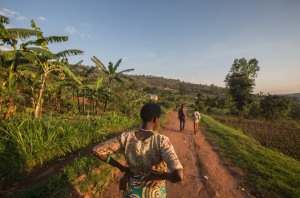In a break from a torrent of writing, I was reading a quick take on Adam Hochschild’s talk at a recent writer’s conference. He’s written Bury the Chains, about the antislavery movement, and of King Leopold’s Ghost, which I find in Africa as often as I find the Bible, and “Blood and Treasure,” the best article on mining (gold, in this case) to come out of Congo in a long time.*
But his book on the boorish Belgian king, required reading for Africanists (often literally), very nearly didn’t make it into print. “I still have the letters,” Hochshild said of his rejects. “‘Nobody is interested in African history’, ‘There is no African history shelf in bookstores’…”
I don’t even recognize the world those publishers described. Today, there are African history bookshelves, in both the erudite indies and the big box stores. Books about Africa top best seller lists with enough frequency that we can’t say the ones that don’t fail because they’re about Africa. And I’m finally getting around to reading one of the most praised first novels to come out in the last ten years, The Beautiful Things that Heaven Bears by Dinaw Mengestu. It takes utterly for granted that Africa, as a part of the world, is interesting to people in other parts of the world:
It’s become a game with us. Name a dictator and then guess the year and country. We’ve been playing the game for over a year now. We’ve expanded our playin field to include failed coups, rebellions, minor insurrections, guerrilla leaders, and the acronyms of as many rebel groups as we can find – the SPLA, TPLF, LRA, UNITA – anyone who has picked up a gun in the name of revolution. No matter how many we name, there are always more, the names, dates, and years multiplying as fast as we can memorize them so that at times we wonder, half-jokingly, if perhaps we ourselves aren’t somewhat responsible.
That’s a passage about the same brutal violence with which Africa is so often associated, particularly by Western media (mea culpa ad infinitum). But it’s also not. It’s about context, culture, humanity. It’s absolutely a different reality than its readers will know -– American kids don’t grow up inventing these kinds of games — but it’s an other reality without all the Othering.
I find the same timbre in Hochschild’s books, which are narrative histories. Surely there are other examples. There must be, because of this I am convinced: the space in which we narrate Africa is changing. The “we” is changing, too -– as much in the posture as in the biography of the writer. Probably one is a reflection of the other, even for those of us who were not born to inherit the continent. The narrative space is changing, and what we’re finally starting to see is something complicated, something troubling, something beautiful. And we’re finally getting smart enough to hold all those things in our head at the same time.
Dear Journalism, will you ever catch up?
—
* Total aside for my readers: It seems the polite thing to do, in the blogosphere, when you mention books by name is to link to a place your browsers can buy them. I’m delighted to facilitate your curiosity, but I link out to IndieBound, which allows you to order by click just like Amazon but processes your order through an independent bookstore. You put in your zip code and it offers you indie retailers near you; you can go there yourself or order online. You won’t get Amazon’s discounts, but you will keep independent bookstores alive, help pay writers fairly and diminish Amazon’s death grip on publishing, which will allow your favorite writers to negotiate better contracts and bring you better books. So take one for the team. After all, in the meaningless cacophony that rules via the Internet, book writers are on your side.



